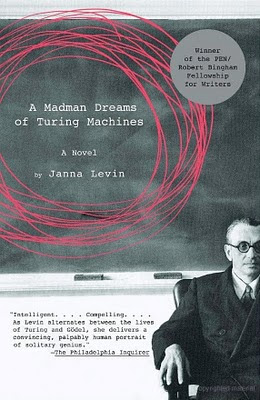 Just finished a terrific book about Alan Turing and Kurt Godel titled A Madman Dreams of Turning Machines by Janna Levin, a work, acting as catalyst, encourages one to think about computability, incompleteness and uncertainty, three concepts defined by Turing, Godel and Werner Heisenberg, which, in every way imaginable, has changed man's view of reality forever.
Just finished a terrific book about Alan Turing and Kurt Godel titled A Madman Dreams of Turning Machines by Janna Levin, a work, acting as catalyst, encourages one to think about computability, incompleteness and uncertainty, three concepts defined by Turing, Godel and Werner Heisenberg, which, in every way imaginable, has changed man's view of reality forever. Alan Turing, the seminal genius who rightfully can be called the father of computing and Artificial Intelligence, articulated the premise of computability via the Universal Turing Machine, the predecessor to all things digital and AI.
Alan Turing, the seminal genius who rightfully can be called the father of computing and Artificial Intelligence, articulated the premise of computability via the Universal Turing Machine, the predecessor to all things digital and AI.

Kurt Godel, the sly, paranoid logician, formally proved truth and provability forever reside in different domains...
"The proof of Gödel's Incompleteness Theorem is so simple, and so sneaky, that it is almost embarassing to relate. His basic procedure is as follows:
- Someone introduces Gödel to a UTM, a machine that is supposed to be a Universal Truth Machine, capable of correctly answering any question at all.
- Gödel asks for the program and the circuit design of the UTM. The program may be complicated, but it can only be finitely long. Call the program P(UTM) for Program of the Universal Truth Machine.
- Smiling a little, Gödel writes out the following sentence: "The machine constructed on the basis of the program P(UTM) will never say that this sentence is true." Call this sentence G for Gödel. Note that G is equivalent to: "UTM will never say G is true."
- Now Gödel laughs his high laugh and asks UTM whether G is true or not.
- If UTM says G is true, then "UTM will never say G is true" is false. If "UTM will never say G is true" is false, then G is false (since G = "UTM will never say G is true"). So if UTM says G is true, then G is in fact false, and UTM has made a false statement. So UTM will never say that G is true, since UTM makes only true statements.
- We have established that UTM will never say G is true. So "UTM will never say G is true" is in fact a true statement. So G is true (since G = "UTM will never say G is true").
- "I know a truth that UTM can never utter," Gödel says. "I know that G is true. UTM is not truly universal."

As for Werner Heisenberg, his Uncertainty Principle proves that man's ability to truly see all aspects of reality will remain beyond his reach until the end of time.
"In quantum mechanics, the Heisenberg uncertainty principle states that certain pairs of physical properties, like position and momentum, cannot both be known to arbitrary precision. That is, the more precisely one property is known, the less precisely the other can be known. This statement has been interpreted in two different ways. According to Heisenberg its meaning is that it is impossible to determine simultaneously both the position and velocity of an electron or any other particle with any great degree of accuracy or certainty."
"One must know one's limitations." - Dirty Harry

1 comment:
and the other meaning is?
Post a Comment